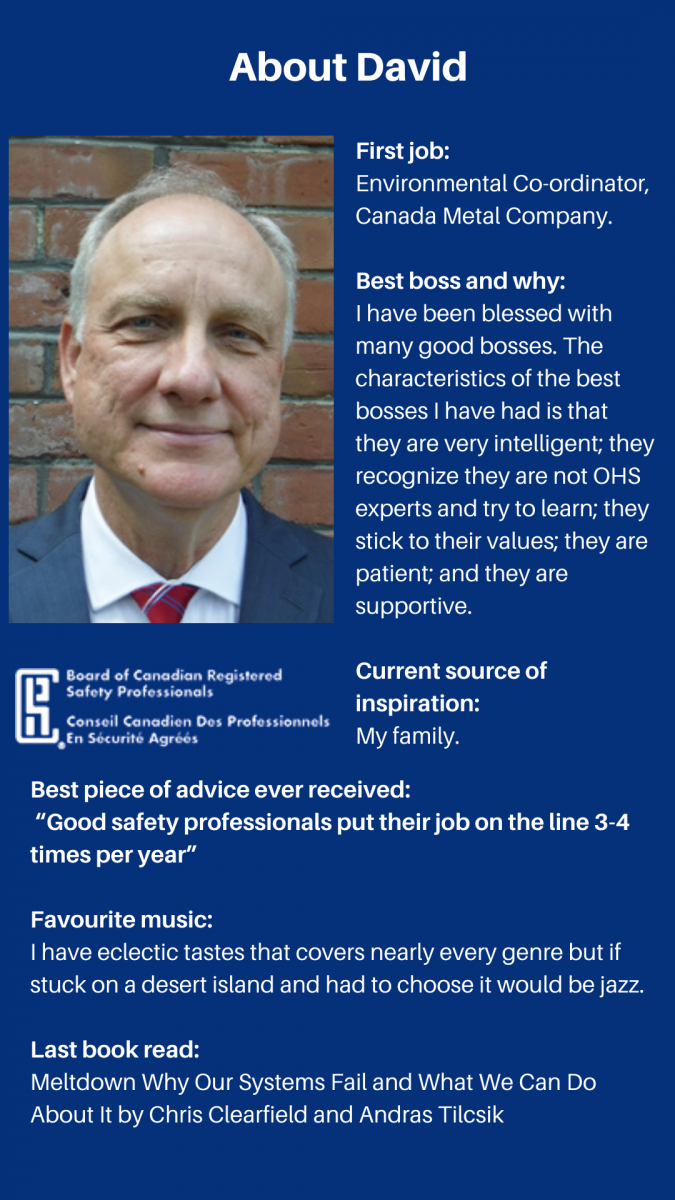When did you decide you wanted a career in occupational health and safety?
After graduation from university I was employed as the Environmental Coordinator for a lead smelter. The job included industrial hygiene work and supervising two technicians. This quickly expanded and I found myself supervising the safety coordinator and occupational health nurse as well as being responsible for 8 operations across Canada. Initially I much preferred the environmental work because, like many people, I didn’t really believe injuries and illness could be prevented. Stuff happens. What I began to experience is that it is very possible to prevent incidents through good safety management systems and save people from death and injury. Knowing that my work would result in saving a life or preventing pain and suffering was when I decided on a career in OHS. Best job in the world.
What was your first occupational health and safety position?
My first involvement with OHS was upon graduation. My entrance into OHS was the management of the industrial hygiene program as part of being the Environmental Coordinator. It grew from there to cover management of workers’ compensation, occupational health, safety, and training.
Tell us about your current job.What are your main areas of responsibility?
Currently I am the Director, Environmental Health and Safety at Toronto Hydro. My main areas of responsibility are occupational health and safety, environmental protection, and sustainability. This includes maintaining certification to ISO 14001 and 45001 which is the framework upon which we manage and control identified risks.
What do you love about your job?
There is never a boring moment! I have been given tremendous latitude, trust and support by my management and peers in building a world class environment health and safety program. For the last 5 years, Toronto Hydro has been recognized as best in class for its safety performance by the Canadian Electricity Association. In 2020, we were recognized by Corporate Knights by placing second in Canada’s Best Corporate Citizens. Of 143 electrical utilities worldwide, Toronto Hydro placed first place by Corporate Knights. It is very rewarding to have contributed to this success.
What are the challenges you experience in your job?
Compared to my manufacturing experiences, the challenge is the immense size, variety, and complexity of the operation. Our workplace is a city with 3 million people covering over 600 square kilometers. We don’t have four walls to control what goes on inside the workplace or a roof to control the environment. This workplace contains lead, asbestos and PCB’s. There are over 8,000 confined space entries per year. Working at heights by 500 employees is everyday. There are about 60,000 transformers and about 170 electrical stations to be maintained. Workplace violence from the public is an issue. All of this and more demands that we have and sustain highly skilled and trained employees to carry out the work supported by robust work practices and procedures, risk assessments, training, inspections, audits, and communications.
What skills are important for success in the OHS field?
This could be the basis of a book. To sum things up, most importantly are leadership skills; technical competence because that will give confidence and build trust; influencing skills; and change agent skills.
What tips do you have for new grads or those in entry level OHS positions who want to move up the ladder?
Employers are looking for generalists not specialists. Choose experience over money. Get as much experience in as wide a range of subjects as possible. Keep learning. This knowledge and experience will make you valuable and the promotions and money will follow. Specialists are seldom promoted.
The OHS field has been evolving. What changes excite you most?
What I find most exciting is that the profession is increasingly being recognized as essential for an organization to be profitable and successful. Forty years ago, only a few safety professionals reached the level of manager and no higher. Today, it is a VP position in progressive organizations. As evidence continues to mount, I believe safety will be increasingly accepted as a key driver of productivity and profitability.
What’s the future of the OHS profession?
The future is what the profession wants it to be. If the profession does not assert itself, others will decide for us what our future will be and we probably will not like it. There is an international movement to harmonize the definition and description of safety professionals’ competencies. Combined with this is a trend to advancing the educational requirements and demonstrated competencies of safety professionals. This direction is essential for the safety profession to earn a seat at the table with the C-suite.
What do you do when you are not working?
Well, prior to COVID-19 it was sailing, hiking, cycling, kayaking, and travelling. Nowadays I am pretty much satisfied with being in my garden, attempting gourmet cooking, and keeping my wife company.

